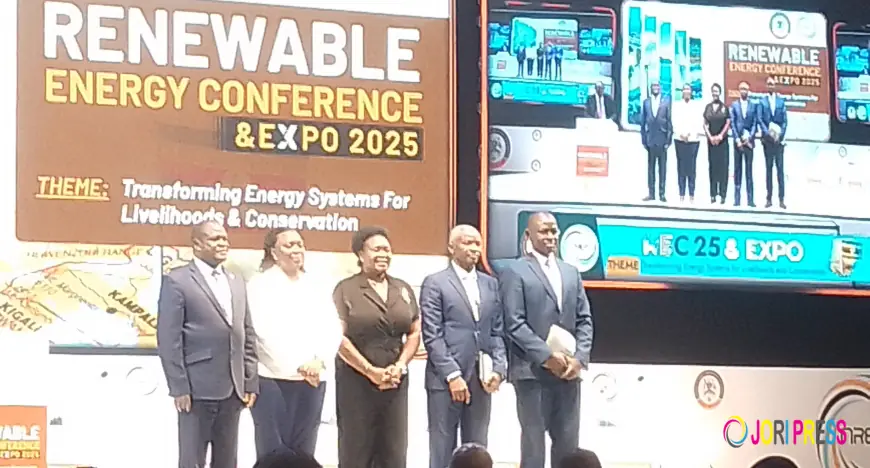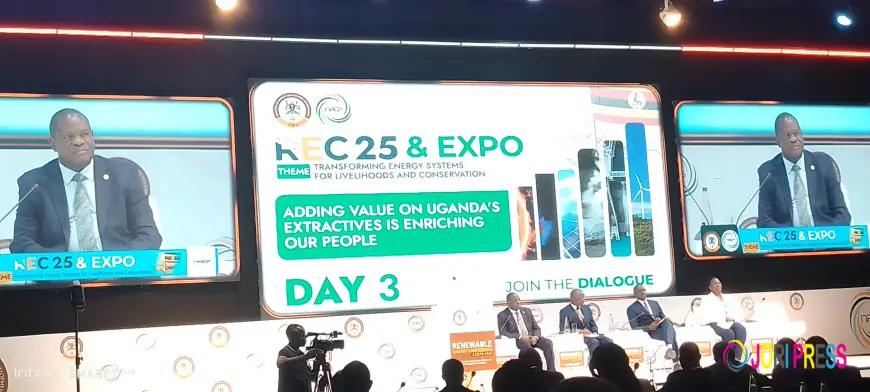Gov’t to address tariff barriers of mineral exploration equipment to boost domestic production.

Uganda’ mineral exploration companies have continued to decry significant costs and barriers on the importation of mineral exploration equipment, high licensing fees, expensive feasibility studies and Environmental and Social Impact Assessments (ESIAs), and high operational costs due to poor infrastructure among other challenges.
These combined challenges according to the companies have increased the overall cost of operating and exploring for minerals in the country.
In response to the concerns raised by the companies, the government through he ministry of finances have planned to meet with investors especially on the plant and machinery imports to address the tariff and non-tariff barriers aimed at incentifying them to import equipment’s, boost domestic product and supply while adding value for exports earning.

DST Patrick Ocailap chairs a session at the conference
The Deputy Secretary to the Treasury (DST) in the Ministry of Finance Mr. Patrick Ocailap in an interview at the sidelines of the Renewable Energy conference in Kampala said that in a bid to address the taxation issues of mineral exploring companies especially on the import of equipment for exploration, the ministry as part of the tax framework proposal for next year financial year will meet with tax administration body “to discuss specific cases where investors have found difficulties in clearing materials due to taxation and find appropriate measures to address them”
DST Ocailap highlighted that to enhance economy integration and sustainable mineral exploration, there is need to support domestic companies to process minerals to have final products produced locally.
“To integrate the economy better and have a sustainability, there need a way in which exploration materials are processed into final products to supply local industries to add value. For example iron ore deposits at Mukono can produce final steel products. In this transition, we need to discuss with manufacturers to find appropriate tax rates as an incentive to domestic industries to enable them continue importing equipment, supplying , adding value for exports and earn money” he said.
He said that there is a need to give a general policy direction after engagement with the energy ministry and URA to represent the interests of the exploring companies especially if the equipment is imported for a stage of exploration process and setting up an environment for investment.
“At times they think exploration equipments are imported by business men for renting business. If it’s clear that the heavy equipment is for the mineral exploration process as part of plant and machinery necessary for investment, you don’t tax investment at that stage of putting up an environment for exploration “he explained.
According to National Planning Authority, Uganda’s mineral resources is key in addressing energy security, economic growth, infrastructure development, agriculture production and food security among other benefits.
Challenges facing the sub sector include inadequate financing especially on exploration, weighbridge infrastructure, understaffed for monitoring regulation and compliance, inadequate infrastructure for value addition among others.
Among the NDP IV mineral developing priorities includes: mineral and exploration quantification, formalizing artisan mineral development, expand and operationalize mineral laboratories, set up mineral production monitoring system and centers, equip and operationalize mineral beneficiation among others.
What's Your Reaction?
 Like
0
Like
0
 Dislike
0
Dislike
0
 Love
0
Love
0
 Funny
0
Funny
0
 Angry
0
Angry
0
 Sad
0
Sad
0
 Wow
0
Wow
0
















































